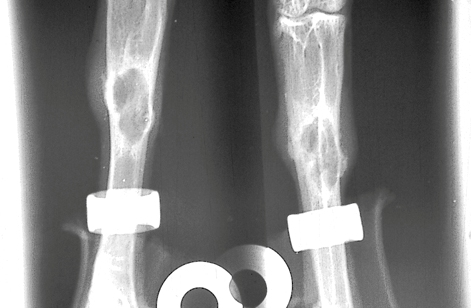Difference between revisions of "Avian Medicine Q&A 05"
Jump to navigation
Jump to search
| Line 13: | Line 13: | ||
|q1= What does the radiograph demonstrate? | |q1= What does the radiograph demonstrate? | ||
|a1= The radiograph shows a locular area of bone lysis in the tarsometatarsus. | |a1= The radiograph shows a locular area of bone lysis in the tarsometatarsus. | ||
| − | |l1= | + | |l1= Osteomyelitis |
|q2= What is the most likely aetiology of this lesion and how would you confirm the diagnosis? | |q2= What is the most likely aetiology of this lesion and how would you confirm the diagnosis? | ||
|a2= Such a lesion is most likely to be due to ''Mycobacterium avium'' osteomyelitis. | |a2= Such a lesion is most likely to be due to ''Mycobacterium avium'' osteomyelitis. | ||
Biopsy of the mass and staining with Ziehl–Neelsen stain for the presence of acid-fast bacilli is diagnostic. If required the organism may also be cultured. | Biopsy of the mass and staining with Ziehl–Neelsen stain for the presence of acid-fast bacilli is diagnostic. If required the organism may also be cultured. | ||
| − | |l2= Mycobacterium avium | + | |l2= Mycobacterium avium#Diagnosis |
|q3= What is the recommended treatment? | |q3= What is the recommended treatment? | ||
|a3= In view of the poor success rate of treating this infection, together with the zoonotic potential, therapy is not recommended. | |a3= In view of the poor success rate of treating this infection, together with the zoonotic potential, therapy is not recommended. | ||
The bird should be euthanased, and any birds that have been kept in the same aviary or who may have access to ground on which this bird had defecated, should be screened for ''M. avium''. | The bird should be euthanased, and any birds that have been kept in the same aviary or who may have access to ground on which this bird had defecated, should be screened for ''M. avium''. | ||
| − | |l3= Mycobacterium avium | + | |l3= Mycobacterium avium#Treatment |
|q4= How is the condition likely to have arisen? | |q4= How is the condition likely to have arisen? | ||
|a4= Infection can theoretically arise due to faecal contamination of open-topped aviaries by infected feral birds or following the ingestion of infected quarry or food. In practice, the vast majority of cases arise after the ingestion of infected quarry or food. | |a4= Infection can theoretically arise due to faecal contamination of open-topped aviaries by infected feral birds or following the ingestion of infected quarry or food. In practice, the vast majority of cases arise after the ingestion of infected quarry or food. | ||
| − | |l4= Mycobacterium avium | + | |l4= Mycobacterium avium#Epidemiology |
</FlashCard> | </FlashCard> | ||
Revision as of 23:08, 16 August 2011
| This question was provided by Manson Publishing as part of the OVAL Project. See more Avian Medicine questions |
The radiograph above shows two views at 90° to each other, of the leg of a 3-year-old female goshawk that was presented lame. The owner was concerned that she might have traumatized the leg whilst out hunting the previous week.
| Question | Answer | Article | |
| What does the radiograph demonstrate? | The radiograph shows a locular area of bone lysis in the tarsometatarsus.
|
Link to Article | |
| What is the most likely aetiology of this lesion and how would you confirm the diagnosis? | Such a lesion is most likely to be due to Mycobacterium avium osteomyelitis.
Biopsy of the mass and staining with Ziehl–Neelsen stain for the presence of acid-fast bacilli is diagnostic. If required the organism may also be cultured. |
Link to Article | |
| What is the recommended treatment? | In view of the poor success rate of treating this infection, together with the zoonotic potential, therapy is not recommended.
The bird should be euthanased, and any birds that have been kept in the same aviary or who may have access to ground on which this bird had defecated, should be screened for M. avium. |
Link to Article | |
| How is the condition likely to have arisen? | Infection can theoretically arise due to faecal contamination of open-topped aviaries by infected feral birds or following the ingestion of infected quarry or food. In practice, the vast majority of cases arise after the ingestion of infected quarry or food.
|
Link to Article | |
